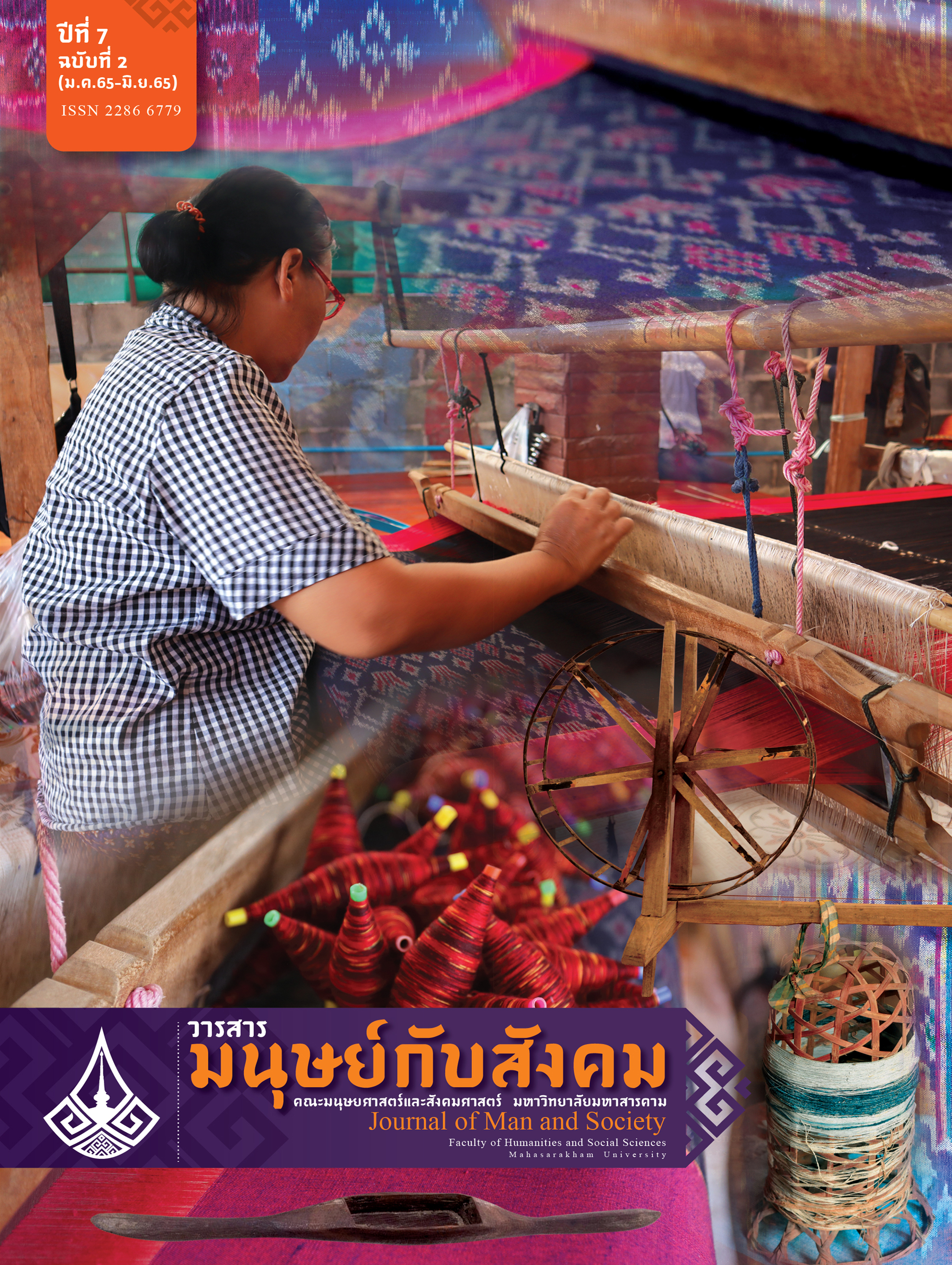กระบวนการพัฒนาผู้ดูแลเด็กตามแนวคิดชุมชนเพื่อการปฏิบัติที่เหมาะสมกับการพัฒนาเด็กปฐมวัย คณะครุศาสตร์ มหาวิทยาลัยราชภัฏศรีสะเกษ และ วิทยาลัยนาฏศิลป์จีนทบุรี
Main Article Content
บทคัดย่อ
การวิจัยครั้งนี้มีวัตถุประสงค์เพื่อ 1) ศึกษากระบวนการพัฒนาผู้ดูแลเด็กตามแนวคิดชุมชนเพื่อการปฏิบัติที่เหมาะสมกับการพัฒนาเด็กปฐมวัยและ 2) นำเสนอความสำเร็จการพัฒนาผู้ดูแลเด็กตามแนวคิดชุมชนเพื่อการปฏิบัติติที่เหมาะสมกับการพัฒนาเด็กปฐมวัย เป็นการวิจัยเชิงคุณภาพ (Qualitative Research) ดำเนินการเก็บข้อมูลจากผู้บริหาร และครูผู้ดูแลเด็กของเล็กโรงเรียนอนุบาลศรีสะเกษ เนื่องจากต้องมีประสบการณ์ จึงใช้วิธีการเลือกแบบเจาะจงเพื่อให้ครอบคลุมบุคลากร จำนวน 20 คน การวิเคราะห์ข้อมูลโดยการศึกษาจากเอกสาร การสัมภาษณ์เชิงลึกและการสังเกตในขณะสัมภาษณ์
ผลการศึกษาพบว่า
1) กระบวนการพัฒนาผู้ดูแลเด็กตามแนวคิดชุมชนเพื่อการปฏิบัติที่เหมาะสมกับการพัฒนาเด็กปฐมวัย มีองค์ประกอบที่สำคัญ ได้แก่ 1.1) ด้านการสร้างความสัมพันธ์กับเด็ก 1.2) ด้านการสร้างความสัมพันธ์กับผู้ปกครอง 1.3) ด้านการจัดสภาพแวดล้อมเพื่อส่งเสริมสุขภาพและความปลอดภัย 1.4) ด้านการจัดสภาพแวดล้อม 1.5) ด้านการจัดการเรียนรู้ที่ส่งเสริมพัฒนาการ 1.6) ด้านการประเมินพัฒนาการการประเมิพัฒนาการและการเติบโตของเด็ก 1.7) สภาพประเด็นเกี่ยวกับภาระงาน 2) สภาพความสำเร็จด้านการบริหารจัดการในการดูแลเด็กระดับองค์กร ประกอบ
ด้วย 2.1) ผู้บริหารมีการติดตามการทำงาน โดยให้ความสำคัญในการปฏิบัติงานของผู้ใต้บังคับบัญชา 2.2) ส่งเสริมเชิงปฏิบัติการในการทำงานเป็นทีมการทำงานร่วมกันร่วมกัน 2.3) วัฒนธรรมและบรรยากาศในการทำงานมีการเรียนรู้สิ่งใหม่ ๆ อยู่เสมอและการนำความรู้มาปฏิบัติงานให้มีประสิทธิภาพมากขึ้น
Article Details

อนุญาตภายใต้เงื่อนไข Creative Commons Attribution-NonCommercial-NoDerivatives 4.0 International License.
เนื้อหาและข้อมูลที่ตีพิมพ์ลงในวารสารมนุษย์กับสังคม ถือเป็นข้อคิดเห็นและความรับผิดชอบโดยตรงของผู้เขียนซึ่งกองบรรณาธิการวารสารไม่จำเป็นต้องเห็นด้วยหรือร่วมรับผิดชอบใดๆ
บทความ ข้อมูล เนื้อหา รูปภาพ ฯลฯ ที่ได้รับการตีพิมพ์ในวารสารมนุษย์กับสังคม ถือเป็นลิขสิทธิ์ของวารสาร หากบุคคลหรือหน่วยงานใดต้องการนำทั้งหมดหรือส่วนหนึ่งส่วนใดไปเผยแพร่ต่อหรือเพื่่อกระทำการใดๆ จะต้องได้รับอนุญาตเป็นลายลักษณ์อักษรจากวารสารมนุษย์กับสังคมก่อน
เอกสารอ้างอิง
จรรยา ชินสี. (2552). แนวทางพัฒนาการจัดการศึกษาระดับ ปฐมวัยของศูนย์พัฒนาเด็กเล็กในเขต
อำเภอแม่ริม จังหวัดเชียงใหม่. วิทยานิพนธ์ศึกษาศาสตรมหาบัณฑิต สาขาบริหารการศึกษา
คณะศึกษาศาสตร์ มหาวิทยาลัยเชียงใหม่.
พรรณนิภา สายหยุด. (2558). แนวทางการพัฒนาการจัดการศึกษาระดับปฐมวัยของศูนย์พัฒนาเด็กเล็ก
เทศบาลแม่โจ้จังหวัดเชียงใหม่. วิทยานิพนธ์ศึกษาศาสตรมหาบัณฑิต สาขาวิชาการบริหารองค์การ
ภาครัฐและเอกชน คณะรัฐประศาสนศาสตร์ มหาวิทยาลัยแม่โจ้.
นิยม ธรรมนูญ. (2553). การพัฒนาบุคลากรในการจัดประสบการณ์การเรียนรู้ระดับปฐมวัยศูนย์
พัฒนาเด็กเล็กบ้านภูมิศาลา ตำบลโคกเพชร อำเภอขุขันธ์จังหวัดศรีสะเกษ. การศึกษา
ค้นคว้าอิสระการศึกษามหาบัณฑิต สาขาวิชาการบริหารการศึกษา คณะศึกษาศาสตร์ มหาวิทยาลัย
มหาสารคาม.
บุญยฤทธิ์ ปิยะศรี. (2558) รูปแบบการพัฒนาวิชาชีพเสริมสร้างสมรรถนะระหว่างบุคคลหลักสูตรการศึกษาปฐมวัย. วิทยานิพนธ์ปรัชญาดุษฏีบัณฑิต สาขาวิชา
หลักสูตรและการสอน คณะศึกษาศาสตร์ มหาวิทยาลัยศิลปกร.
ภัทรวดี แก้วกระจาย. (2555). การนำเสนอแนวทางการพัฒนาการบริหารงานวิชาการของศูนย์พัฒนาเด็กเล็กสังกัดองค์กรปกครองส่วนท้องถิ่น จังหวัดอ่างทอง.
วิทยานิพนธ์ครุศาสตรมหาบัณฑิต สาขาวิชาการบริหารการศึกษา คณะครุศาสตร์ มหาวิทยาลัยราชภัฏพระนครศรีอยุธยา.
วัชราภรณ์ เชี่ยววัฒนา และสุปรีดา มณิปันติ. การดูแลเด็กปฐมวัยในศูนย์เด็กเล็กน่าอยู่คู่นมแม่ของโรงพยาบาลในสังกัดกรุงเทพมหานคร. วารสารเกื้อการุณย์,
(2): 51-68.
สถาบันแห่งชาติเพื่อการศึกษาสำหรับเด็กปฐมวัย. (2560). หลักสูตรการศึกษาปฐมวัย. พิมพ์ครั้งที่ 1.
กรุงเทพฯ: โรงพิมพ์สหกรณ์การเกษตรแห่งประเทศไทย.
สว่างจิตร วิเศษ. (2556). การพัฒนาบุคลากรด้านการจัดกิจกรรมการเรียนการสอนแบบบูรณาการโรงเรียนเทศบาล 7 เทศบาลอุดร อำเภอเมืองจังหวัดอุดร.
วารสารมหาวิทยาลัยนครพนม, 3(1): 93–99.
สำนักงานเลขาธิการสภาการศึกษา. (2560). แผนการศึกษาแห่งชาติ พ.ศ.2560-2579. พิมพ์ครั้งที่ 1.
กรุงเทพฯ: พริกหวานกราฟฟิค.
สุภางค์ จันทวานิช. (2554). การวิเคราะห์ข้อมูลในการวิจัยเชิงคุณภาพ. (พิมพ์ครั้งที่ 9). กรุงเทพฯ:
โรงพิมพ์จุฬาลงกรณ์มหาวิทยาลัย.
สุดารัตน์ สอดเสน. (2556). การศึกษาปัญหาในการดำเนินงานศูนย์พัฒนาเด็กเล็ก สังกัดองค์กร
ปกครองส่วนท้องถิ่น ในเขตอำเภอบ้านกรวด. วิทยานิพนธ์ครุศาสตรมหาบัณฑิต สาขาวิชาการบริหาร
การศึกษา คณะครุศาสตร์ มหาวิทยาลัยราชภัฏบุรีรัมย์.
โสรดา จิตรฉาย. (2555). การศึกษาสภาพปัญหา และแนวทางแก้ไขการจัดการศึกษาศูนย์พัฒนาเด็กเล็ก
ขององค์การปกครองส่วนท้องถิ่น ในจังหวัดพระนครศรีอยุธยา. วิทยานิพนธ์ครุศาสตรมหาบัณฑิต
สาขาวิชาหลักสูตรและการสอน คณะครุศาสตร์ มหาวิทยาลัยราชภัฏพระนครศรีอยุธยา.
Gestwicki,C. (1999). Developmentally Appropriate Practice: Curriculum and
development in early education. Boston: Delmar Publisher.
McDermott, Richard, and Snyder, Williams C., Cultivating Communities of Practice: A Guide to Managing Knowledge, Harvard Business
School Press, Cambridge, USA, 2002, 304 pages (ISBN 1-5781-330-8).
Melhuish, E.C., Sylva, K., Sammons, P., Siraj-Blatchford, I. & Taggart, B. (2001). The Effective Provision of Preschool Education Project,
Technical Paper 7: Social/behavioralAnd cognitive development at 3-4 years in relation to family background. London: Institute
of Education/DfES.
Senge, P. M., N. Cambron-McCabe, T. Lucas, A. Kleiner, J.Dutton, & B. Smith. (2000).
Schools that Learn: A Fifth Discipline Fieldbook for Educators, Parents,and
Everyone Who Cares about ion. New York: Doubleday.
Wenger, E. (1998). Communities of practice: Learning, meaning, and identity.
Cambridge University Press. [Online]. Available form:
https://doi.org/10.1017/CBO9780511803932. [accessed 5 January 2020]
Weiss, Heather B; Caspe Margaret; and Lopez, M. Elena. (2006). Family Involvement in
Early Childhood Education. Harvard Family Research Project. [Online]. Available form:
www.gse. harvard.edu/hfrp/project/fine/resources/guide.html. [accessed 5 January 2020]


